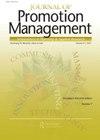The Association between Brand Trust, Familiarity and Personal Information Disclosure: A Case of Japanese Consumers
Q2 Business, Management and Accounting
引用次数: 0
Abstract
AbstractThis study examined the effects of personal information types and brand familiarity on Japanese consumers’ perceived brand trust, privacy concerns, and anxiety about personal information disclosure to marketers. It also investigated how the cultural dimensions of Japanese consumers affect the relationships between privacy concerns, perceived brand trust, and personal information disclosure outcomes. The results of an online experiment (n = 771) showed that neither personal information requested nor brand familiarity affected Japanese consumers’ anxiety about personal information disclosure. However, cultural factors, namely uncertainty avoidance and independent self-construal, moderated the relationship between brand trust and anxiety regarding personal information disclosure to marketers.Keywords: information disclosureculturebrand trustcommunication privacy managementJapanese consumers Ethics statementThis research was approved by the Ethics Review Committee on Research with Human Subjects of Waseda University (#2022-024).Disclosure statementNo potential conflict of interest was reported by the author(s).Additional informationFundingThis work was supported by JSPS KAKENHI under Grant-in-Aid for Scientific Research (C) Grant Number: 20K01975.品牌信任、熟悉度与个人信息披露的关系:以日本消费者为例
摘要本研究考察了个人信息类型和品牌熟悉度对日本消费者感知的品牌信任、隐私关注和个人信息向营销人员披露的焦虑的影响。它还调查了日本消费者的文化维度如何影响隐私关注、感知品牌信任和个人信息披露结果之间的关系。一项在线实验(n = 771)的结果显示,个人信息要求和品牌熟悉度都不影响日本消费者对个人信息披露的焦虑。然而,文化因素,即不确定性规避和独立自我解释,调节了品牌信任与向营销人员披露个人信息焦虑之间的关系。关键词:信息披露文化品牌信任沟通隐私管理日本消费者伦理声明本研究获得早稻田大学人类受试者研究伦理审查委员会(#2022-024)批准。披露声明作者未报告潜在的利益冲突。本研究由JSPS KAKENHI资助,科学研究资助(C)资助号:20K01975。
本文章由计算机程序翻译,如有差异,请以英文原文为准。
求助全文
约1分钟内获得全文
求助全文
来源期刊

Journal of Promotion Management
Business, Management and Accounting-Marketing
CiteScore
6.10
自引率
0.00%
发文量
26
期刊介绍:
The Journal of Promotion Management will keep you up-to-date on applied research and planning in promotion management. It is designed for practitioners in advertising, public relations, and personal selling, as well as academicians, researchers, and teachers in these areas. Every year, businesses in the United States budget approximately two-thirds of all marketing money into consumer and trade promotions designed to push products through the distribution chain. Any successful brand marketing plan relies on promotion, whether to stimulate immediate sales or ensure continued commerce.
 求助内容:
求助内容: 应助结果提醒方式:
应助结果提醒方式:


